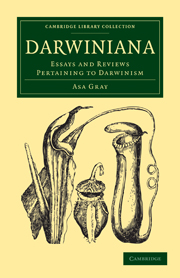Book contents
- Frontmatter
- PREFACE
- Contents
- ARTICLE I THE ORIGIN OF SPECIES BY MEANS OF NATURAL SELECTION
- ARTICLE II DESIGN versus NECESSITY—A DISCUSSION
- ARTICLE III NATURAL SELECTION NOT INCONSISTENT WITH NATURAL THEOLOGY
- ARTICLE IV SPECIES AS TO VARIATION, GEOGRAPHICAL DISTRIBUTION, AND SUCCESSION
- ARTICLE V SEQUOIA AND ITS HISTORY: THE RELATIONS OF NORTH AMERICAN TO NORTH-EASTERN ASIAN AND TO TERTIARY VEGETATION
- ARTICLE VI THE ATTITUDE OF WORKING NATURALISTS TOWARD DARWINISM
- ARTICLE VII EVOLUTION AND THEOLOGY
- ARTICLE VIII “WHAT IS DARWINISM?”
- ARTICLE IX CHARLES DARWIN: SKETCH ACCOMPANYING A PORTRAIT IN “NATURE”
- ARTICLE X INSECTIVOROUS PLANTS
- ARTICLE XI INSECTIVOROUS AND CLIMBING PLANTS
- ARTICLE XII DURATION AND ORIGINATION OF RACE AND SPECIES
- ARTICLE XIII EVOLUTIONARY TELEOLOGY
- INDEX
ARTICLE IV - SPECIES AS TO VARIATION, GEOGRAPHICAL DISTRIBUTION, AND SUCCESSION
Published online by Cambridge University Press: 05 October 2010
- Frontmatter
- PREFACE
- Contents
- ARTICLE I THE ORIGIN OF SPECIES BY MEANS OF NATURAL SELECTION
- ARTICLE II DESIGN versus NECESSITY—A DISCUSSION
- ARTICLE III NATURAL SELECTION NOT INCONSISTENT WITH NATURAL THEOLOGY
- ARTICLE IV SPECIES AS TO VARIATION, GEOGRAPHICAL DISTRIBUTION, AND SUCCESSION
- ARTICLE V SEQUOIA AND ITS HISTORY: THE RELATIONS OF NORTH AMERICAN TO NORTH-EASTERN ASIAN AND TO TERTIARY VEGETATION
- ARTICLE VI THE ATTITUDE OF WORKING NATURALISTS TOWARD DARWINISM
- ARTICLE VII EVOLUTION AND THEOLOGY
- ARTICLE VIII “WHAT IS DARWINISM?”
- ARTICLE IX CHARLES DARWIN: SKETCH ACCOMPANYING A PORTRAIT IN “NATURE”
- ARTICLE X INSECTIVOROUS PLANTS
- ARTICLE XI INSECTIVOROUS AND CLIMBING PLANTS
- ARTICLE XII DURATION AND ORIGINATION OF RACE AND SPECIES
- ARTICLE XIII EVOLUTIONARY TELEOLOGY
- INDEX
Summary
Étude sur l'Espèce, à l'Occasion d'une Révision de la Famille des Cupulifères, par M. Alphonse De Candolle.—This is the title of a paper by M. Alph. De Candolle, growing out of his study of the oaks. It was published in the November number of the Bibliothèque Universelle, and separately issued as a pamphlet. A less inspiring task could hardly be assigned to a botanist than the systematic elaboration of the genus Quercus and its allies. The vast materials assembled under De Candolle's hands, while disheartening for their bulk, offered small hope of novelty. The subject was both extremely trite and extremely difficult. Happily it occurred to De Candolle that an interest might be imparted to an onerous undertaking, and a work of necessity be turned to good account for science, by studying the oaks in view of the question of species.
What this term species means, or should mean, in natural history, what the limits of species, inter se or chronologically, or in geographical distribution, their modifications, actual or probable, their origin, and their destiny—these are questions which, surge up from time to time; and now and then in the progress of science they come to assume a new and hopeful interest. Botany and zoölogy, geology, and what our author, feeling the want of a new term, proposes to name epiontology, all lead up to and converge into this class of questions, while recent theories shape and point the discussion.
- Type
- Chapter
- Information
- DarwinianaEssays and Reviews Pertaining to Darwinism, pp. 178 - 204Publisher: Cambridge University PressPrint publication year: 2009First published in: 1876



